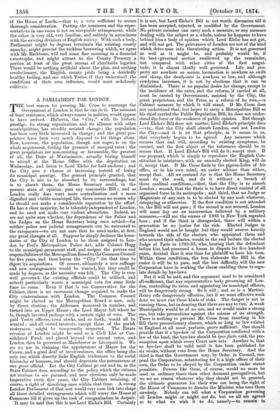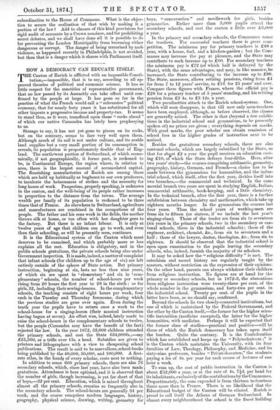A PARLTAinNT FOR LONDON.
THE best reason for pressing Mr. Cross to rearrange the Government of London is that he can do it. The moment of least resistance, which always comes in politics, would appear to have arrived. Hitherto, the "City," with its historic prestige, its strong organisation, and its alliance with other municipalities, has steadily resisted change ; the population has been very little interested in change ; and the great pro- prietors have been very much disposed to let things alone. Now, however, the population, though not eager' is on the whole acquiescent, feeling the pressure of unequal rates ; the great proprietors are non-resisting or favourable, the greatest of all, the Duke of Westminster, actually boring himself to attend at the Home Office with the deputation on Wednesday, and listen to Lord Elcho for half-an-hour ; and the City sees a chance of increasing instead of losing its municipal prestige. The general principle granted, that the City is not to be absorbed by its surroundings, but is to absorb them, the Home Secretary could, in the present state of opinion, pass any reasonable Bill ; and as London really does want more centralisation and a more dignified and visible municipal life, there seems no reason why he should not make a considerable reputation by the effort. He has a clear majority, he is tolerably independent of London, and he need not make very violent alterations. Indeed, we are not quite sure whether, the dependence of the Police and the Judges on the Home Secretary being once settled—for neither police nor judicial arrangements can be entrusted to the ratepayers—we are not sure that he need make, at first, any great changes at all. Suppose he simply declares the boun- daries of the City of London to be those assigned to Lon- don by Peel's Metropolitan Police Act, adds Colonel Hogg to the municipal permanent staff, and assigns the powers and responsibilities of the Metropolitan Board to the Common Council for five years, and then leaves the " City " for that time to digest its acquisitions. Of course, ultimately a new suffrage and new arrangements would be wanted, but they could be made by degrees, as the necessity was felt. The City is very well governed, the existing officials could be utilised, and nobody particularly wants a municipal vote for some little time to come. Even if that is too Conservative for the Cabinet, there is no enormous change required to make the City conterminous with London. The Common Council might be elected as the Metropolitan Board is now, only by direct election; the Aldermen increased in number, and turned into an Upper House ; the Lord Mayor left where he is, though invested perhaps with a certain right of veto. The paid Vestry officers, town clerks, and so forth, would all be wanted ; and all vested interests, except those of the parish vestrymen, might be temporarily respected. The Estate revenue of London might be used as a Civil List or Con- solidated Fund, and placed beyond • the annual votes, and London then be governed as Manchester or Liverpool is. We see no use in 'claiming the appointMent of Mayor for the Crown, and a good deal of inconvenience the office being the only one which directly links English tradesmen to the social hierarchy of honours and should deprecate the permanence of any great official. Let the City Cabinet go out and in, as the State Cabinet does, according to the policy which the citizens are anxious to see pursued, and new elections only be made imperative every five years, the City Cabinet retaining, of course, a right of dissolving once within that time. A strong London Parliament of that sort would very soon lick into shape all those detailed arrangements which will worry the House of Commons till it gives up the task of reorganisation in despair.
It may be said that this is not Lord Elcho's Bill. Certainly it is not, but Lord Elcho's Bill is not worth discussion till it has been accepted, rejected, or modified by the Government. No private member can carry such a measure, or any measure dealing with the subject as a whole, unless he happens to have behind him a body of opinion which Lord Elcho has not got,
and will not get. The grievances of London are not of the kind
which drive men into threatening action. It is not governed as well as it might be, and probably would be, if its best-governed section swallowed up the remainder, but compared with other cities of the first magni- tude, it is almost ideally well governed. Life and pro- perty are nowhere so secure, locomotion is nowhere so swift and cheap, the death-rate is nowhere so low, and although rowdyism increases, it is not by elections that it can be diminished. There is no popular desire for change, except in the incidence of the rates, and the reform, if carried at all, must be carried by Government, assisted by the City, the great proprietors, and the Press, as a reform of its own,—a Cabinet measure by which it will stand. If Mr. Cross does not understand that, but hopes to carry a Metropolitan Bill as his chief carried the Public Regulation Bill, he does not under- stand the force or the weakness of public opinion. But though Lord Elcho's Bill does not matter, Lord Elcho's principle does —viz., that the City shall absorb London, and not London the City—and it is on that principle, as it seems to us, that everybody begins to be agreed. Any measure which secures that end will, according to existing symptoms, be carried, and the first object of the reformers should be to secure that. If Lord Elcho's Bill will do, it,.accept that. If our proposal, which is simply to reproduce the English Con- stitution in miniature, with an annually elected Sing, will do it, accept that. If ifr. Cross finds in the pigeon-holes of his office, or in his own mind, an easier scheme than either, accept that. All we contend for is that the Home Secretary must do the work, and do it without a breach of
three cardinal conditions,—first, that the City is to absorb London ; second, that the State is to have direct control of all organised force in its metropolis ; and third, that no Judge or Magistrate of any sort is to be elected by any mob whatever, ratepaying or otherwise. If the first condition is not attended to, the Bill will not pass ; if the second is not secured, London will some day see an insurrection followed by a military massacre,—will see the scenes of 1863 in New York repeated here ; and if the third is disregarded, there will within a generation be no justice for the rich. Elected Judges in England would not be bought .but they would swerve heavily towards the side of the electors who appointed them and who secured their salaries, would in the end imitate the elected Judge of Pam in 1793-95, who, hearing that the defendant before him had possessed a house in dispute for five hundred years, decided that it was time for plaintiff to have his turn. Within these conditions, the less elaborate the Bill is, the easier it will be to pass and the less difficulty will the new Corporation have in working the clause enabling them to regu- late details by bye-laws. But it will be said, and this argument used to be considered all-sufficient, that any representative body governing all Lon- don, controlling its rates, and appointing its municipal officers, will be dangerously strong. So it will ; and so is a Martini- Henry rifle dangerously effective, but if we want effective work done we must run those kinds of risks. The danger is not in running them, but in denying that there are any to run: A weak Municipality would be of no use, and we would make a strong one, but take precautions against the misuse of its strength. There is nothing to prevent Mr. Cross from inserting in his Bill three precautionary clauses, which as long as law existed in England at all must, perforce, prove sufficient. One should provide that if a bye-law of the Corporation conflicted with a law of the land, the bye-law should be ipso facto void, the pre- sumption upon which every Court now acts. Another is, that no bye-law shall be valid until it has been published for six weeks, without veto from the Home Secretary. And the third is that the Government may, by Order in Council, sus- pend the Corporation, substituting for it a high officer of their own, the Order to be obeyed by the Corporation under stated penalties. Powers like these, of course, would no more be used in ordinary times than other dormant prerogatives, but we see no reason whatever why they should not be granted, the ultimate guarantee for their wise use being the right of the House of Commons to dismiss the Minister who uses them unwisely. Nobody can tell what a Corporation governing all London might or might not do, but we all are agreed as to what we wish it to do, namely—to remain in
subordination to the House of Commons. What is the objec- tion to secure the realisation of that wish by making it a portion of the law Add to clauses of this kind provisions for rigid audit of accounts by a Crown nominee, and for prohibiting secret debates, and we shall have done all it is possible to do for preventing the London Municipality from becoming either dangerous or corrupt. The danger of being terrorised by mob violence, as happened recently in Philadelphia, is not avoided, but then that is a danger which it shares with Parliament itself.







































 Previous page
Previous page